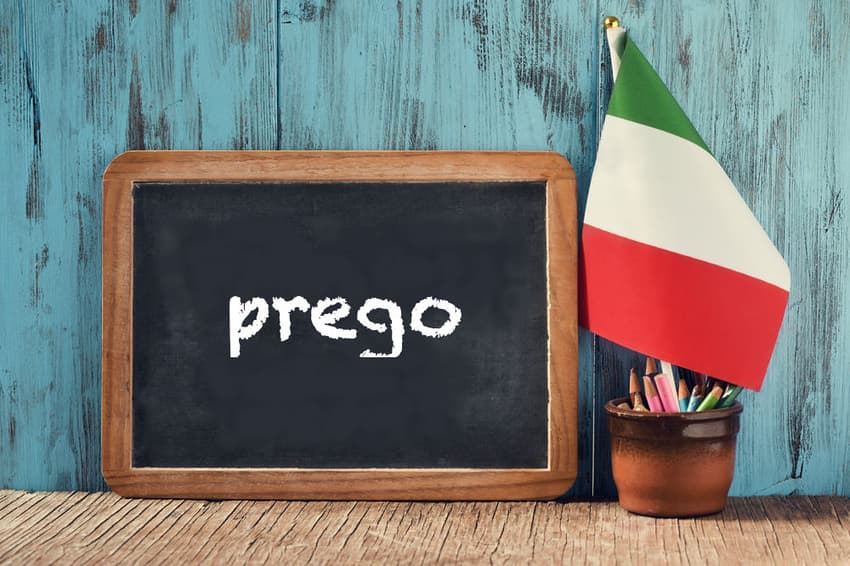Italian word of the day: 'Prego'

It's only polite to know this crucial Italian term.
A reader of The Local Italy recently wrote to ask about the use of a word you'll hear at least a dozen times a day in the Italian-speaking part of Switzerland: prego.
It's a great reminder that it's always important to get the basics right – and this word is one you need to master from the get-go. It's every bit as fundamental as per favore ('please') and grazie ('thank you'), and arguably more versatile.
Click here to hear prego pronounced:
The most common translation is 'you're welcome': prego is what you say when someone else thanks you.
– Grazie mille!
– Prego.
– Thanks very much!
– You're welcome.
Similarly, it can means 'that's quite alright' – whether someone's thanking you for something that's no big deal or asking your forgiveness.
– Mi scuso per il ritardo.
– Prego.
– Sorry I'm late.
– It's fine.

But prego can also take on the sense of 'please' – when you're encouraging someone to make themselves at home, for instance, or inviting them to follow you. Think of this version as 'you're welcome to [do something]'.
Ne prenda ancora, prego!
Please, have some more!
Prego, si accomodi.
Please, take a seat.
You can also use prego this same way to assent when someone asks you for permission – like 'yes, please do'.
– Posso prenderlo?
– Prego!
– Can I take it?
– Please do!
It all makes sense when you consider where prego comes from: the verb pregare, which means 'to pray' or 'to beseech'. Remember how in English you sometimes hear "pray tell"? It's effectively "please tell" – just the same as Italian, but we use it a lot less nowadays.
Prego is the first person singular ('I pray'), but you might encounter it in other conjugations in formal Italian, when someone's making a really polite request.
La pregherei di non fumare.
I would beseech you to please refrain from smoking.
When you use a pronoun, it turns prego into more of a supplication: 'I beg you'.
Ti prego, non farlo!
Don’t do it, I beg you!

But to go back to plain old prego, there's one final use that comes in very handy.
You can also use it to ask someone politely to repeat themselves when you haven't understood: like saying 'pardon?'
Come ha detto, prego?
What did she say, pardon?

Do you have an Italian word you'd like us to feature? If so, please email our editor George Mills with your suggestion.
Comments
See Also
A reader of The Local Italy recently wrote to ask about the use of a word you'll hear at least a dozen times a day in the Italian-speaking part of Switzerland: prego.
It's a great reminder that it's always important to get the basics right – and this word is one you need to master from the get-go. It's every bit as fundamental as per favore ('please') and grazie ('thank you'), and arguably more versatile.
– Grazie mille!
– Prego.
– Thanks very much!
– You're welcome.
Similarly, it can means 'that's quite alright' – whether someone's thanking you for something that's no big deal or asking your forgiveness.
– Mi scuso per il ritardo.
– Prego.
– Sorry I'm late.
– It's fine.

But prego can also take on the sense of 'please' – when you're encouraging someone to make themselves at home, for instance, or inviting them to follow you. Think of this version as 'you're welcome to [do something]'.
Ne prenda ancora, prego!
Please, have some more!
Prego, si accomodi.
Please, take a seat.
You can also use prego this same way to assent when someone asks you for permission – like 'yes, please do'.
– Posso prenderlo?
– Prego!
– Can I take it?
– Please do!
It all makes sense when you consider where prego comes from: the verb pregare, which means 'to pray' or 'to beseech'. Remember how in English you sometimes hear "pray tell"? It's effectively "please tell" – just the same as Italian, but we use it a lot less nowadays.
Prego is the first person singular ('I pray'), but you might encounter it in other conjugations in formal Italian, when someone's making a really polite request.
La pregherei di non fumare.
I would beseech you to please refrain from smoking.
When you use a pronoun, it turns prego into more of a supplication: 'I beg you'.
Ti prego, non farlo!
Don’t do it, I beg you!

But to go back to plain old prego, there's one final use that comes in very handy.
You can also use it to ask someone politely to repeat themselves when you haven't understood: like saying 'pardon?'
Come ha detto, prego?
What did she say, pardon?

Do you have an Italian word you'd like us to feature? If so, please email our editor George Mills with your suggestion.
Join the conversation in our comments section below. Share your own views and experience and if you have a question or suggestion for our journalists then email us at [email protected].
Please keep comments civil, constructive and on topic – and make sure to read our terms of use before getting involved.
Please log in here to leave a comment.